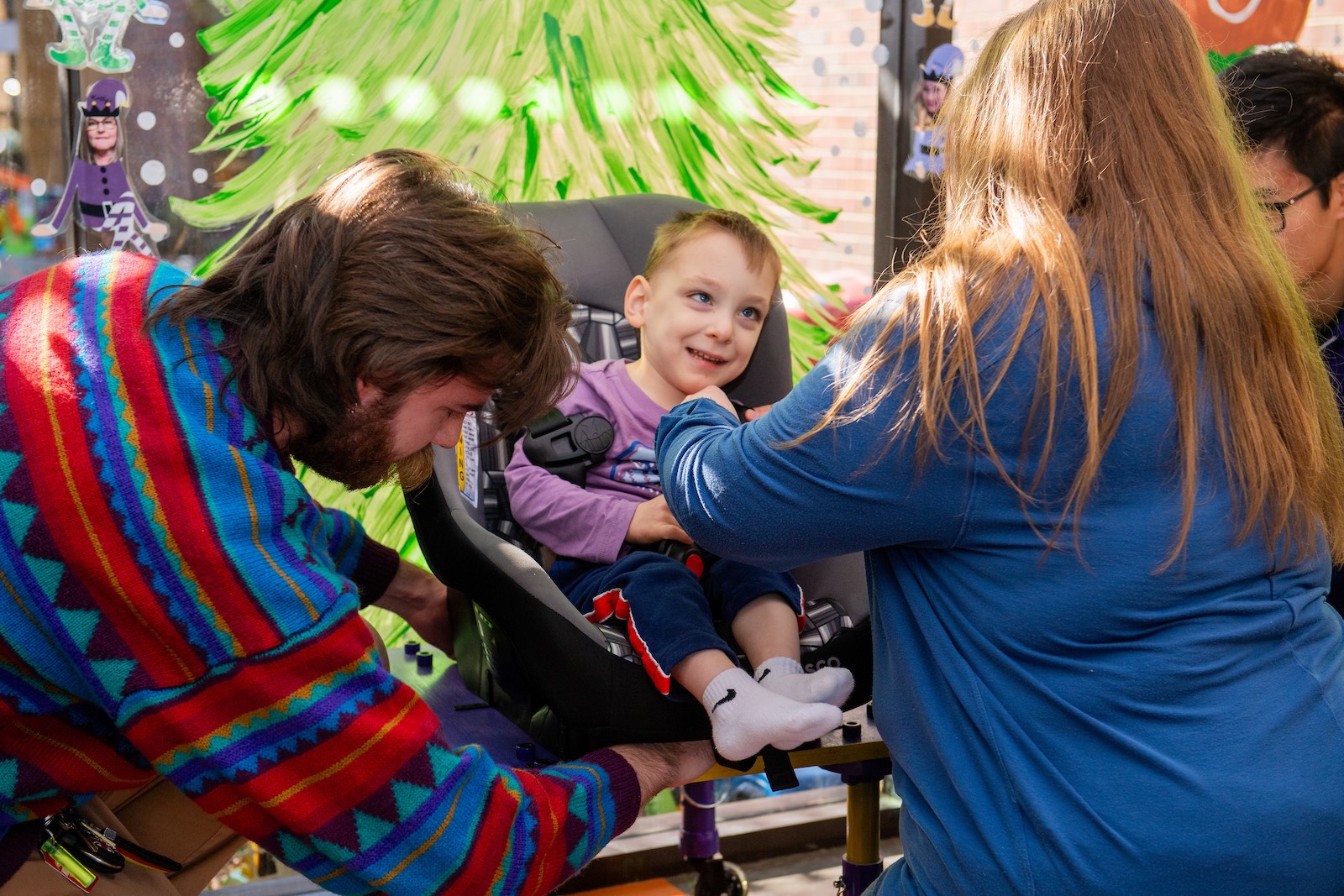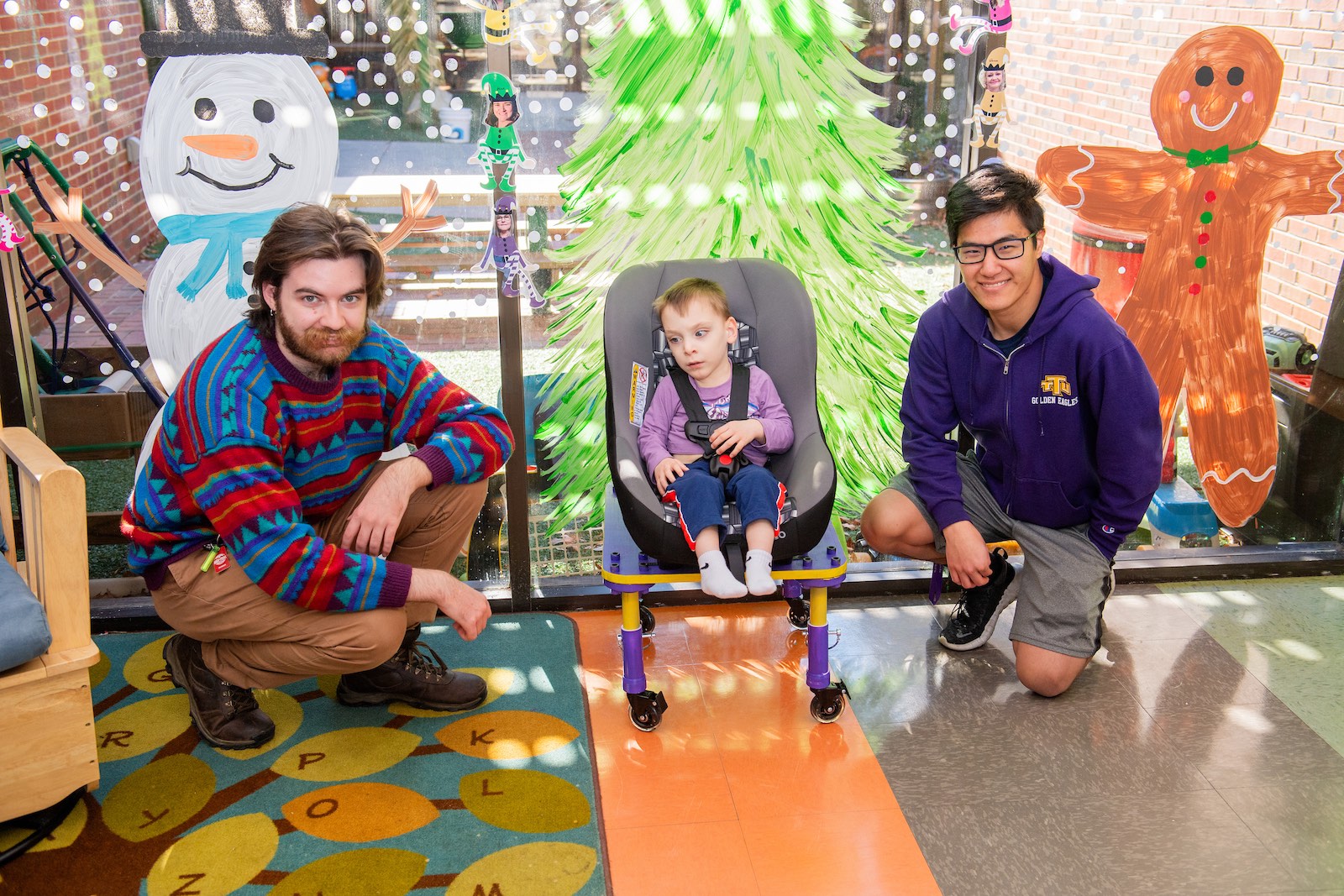News
Tech engineering students design adjustable chair for preschooler with special needs

Tech student Ian Sweetin, Tech Child Development Lab teacher Jacquelyn Smith and Tech
student Caleb Harman, place Ben into his specially-designed chair.
He may not have been able to say thank you, but his giant smile said enough when Tennessee
Tech University engineering students put him in a chair designed just for him.
Ben, a preschooler in the Child Development Lab on Tech's campus, is one of several
local children with special needs who benefitted this year from the Tech Engineering
for Kids (TEK) program. The program matches a child with a specific need to a team
of Tech engineering students in Stephen Canfield’s kinematics and dynamics of machinery
course for mechanical engineering.
“His challenge is with fine motor skills, which means he can’t sit in traditional
preschool chairs alongside his classmates, so our goal was to design a supportive
chair that’s height adjustable and can grow with him over the next few years,” said
Peyton Pope, one of four mechanical engineering students on the design team for the
project.
Ben had been sitting strapped into a stroller in the classroom, but it wasn’t comfortable
for him long-term, and it often kept him seated at a level higher or lower than his
classmates.
“We talked with his teachers and caregivers to define Ben’s need, but it was up to
us to use our engineering knowledge to provide the best solution,” Pope said.
They found that Ben needed back and head support, as well as a strap to help keep
him upright and not slide down in the seat, so the team of Tech engineering students
started by modifying a car seat.
“We could have specially designed the seat portion of his chair, but we found that
a modified car seat met his needs in the most economical way,” said Ian Sweetin, another
student team member.
From there, the team designed a base for the modified car seat to attach to and added
legs that can be raised or lowered depending on the table or counter height Ben needs
to reach. Wheels with locking mechanisms mean he can be either mobile or stationary
and make it easy for his teachers to move him as needed. And of course, the design
wouldn’t have been complete without some Tech purple and gold flair customized just
for Ben.
The greatest challenge of the project was working without predetermined project parameters,
said engineering student Caleb Harman.
“When we’re working on a theoretical project, the design parameters are provided for
us, but not when we’re working on a real-life learning scenario. We had to figure
that out for ourselves,” he said.
Despite that challenge, the team says the course was life-changing not only for Ben,
with the convenience his new chair provides, but for them too.
“Up until now, my engineering classes have been all theoretical. This is the first
one I’ve had where I’ve been able to apply what I’ve learned – and it’s rewarding
to directly see how our work is helping someone else,” Sweetin said.
“We don’t often get to see the result of our work as engineering students, but this
class shows us that our work does have an impact. Instead of just seeing it on paper
or on a computer screen, we’ve had the opportunity to see that our work has been accomplishing
something to help someone who needs it,” Pope said.
Harman said he’s proud to have been a part of this course and this specific project.
“I’m proud I was able to apply my knowledge in a way that I could see its practical
benefit,” he said.
The fourth member of the team, in addition to Harman, Pope and Sweetin, was Jacob
Cotten.
Ben was one of more than a dozen children in Middle Tennessee to receive specially
engineered equipment from various mechanical engineering teams participating in the
course this semester.
“I’ve been teaching this class now for over 20 years, and while service learning is
not a new concept in education, I knew I wanted to focus on kids and provide my students
opportunities to develop assistive technology that either doesn’t already exist or
isn’t easily obtained,” Canfield said.
From left: Tech student Ian Sweetin, preschool student Ben, and Tech student Caleb
Harman.
The class was borne out of a partnership among Tech’s colleges of Engineering and
Education and the Tennessee Early Intervention System, a partnership which still exists.
Other project partners include Cumberland, Putnam and White County school systems,
Cookeville Regional Medical Center, and regional therapy providers. Supporters include
Cookeville Bicycles, NAPA Auto Parts of Cookeville and Cookeville Junior Women’s Club.
For more about the Tech Engineering for Kids program and to view other Fall 2023 projects,
visit the website at https://techengineeringforkids.com.

